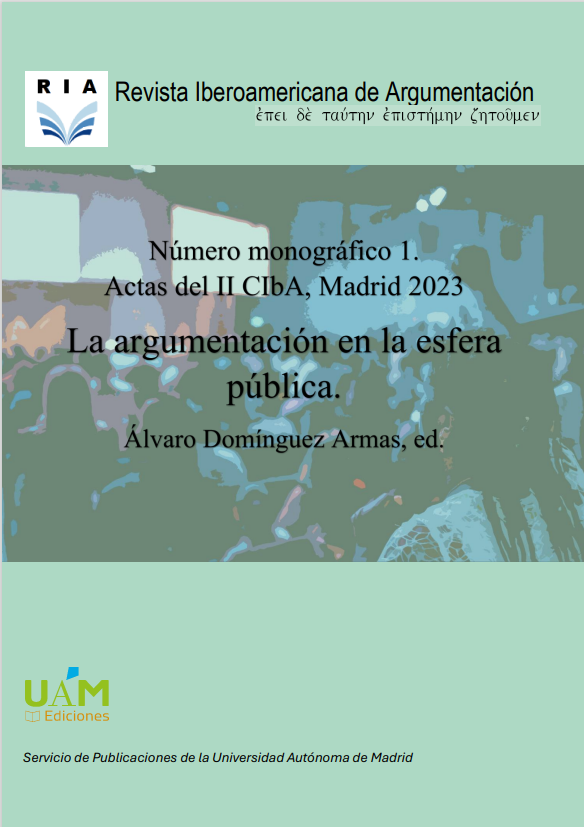Mots-clés :
actos de habla complejos, competencia modal deóntica, desacuerdo, diálogo deliberativo, efecto ilocutivo, interacción ilocutiva, M. Sbisà(c) Tous droits réservés Revista Iberoamericana de Argumentación 2024

Ce travail est disponible sous licence Creative Commons Attribution - Pas d'Utilisation Commerciale - Pas de Modification 4.0 International.
Résumé
La maniobra del abogado del diablo es conocida y comúnmente caracterizada como una estrategia argumentativa virtuosa, cuyo uso en diferentes ámbitos de discusión es fomentado debido a sus múltiples beneficios epistémicos. Sin embargo, se observan hoy en día cada vez más ejemplos de conversaciones sobre discriminación y opresión racial y de género donde la maniobra se está convirtiendo en una táctica argumentativa perniciosa. En este artículo, sugerimos que esta degeneración de la maniobra se debe a un uso incorrecto de su característica fuerza ilocutiva. Sostenemos, además, que adoptar un enfoque normativo de los actos de habla resulta más adecuado para describir tanto los tipos de usos incorrectos, como sus efectos en los participantes de la conversación.
Téléchargements
Références
Aikin, S. F. y J. C. Clanton (2010). “Developing Group-Deliberative Virtues”. En: Journal of Applied Philosophy 27/4, 409-424.
Brown, P. y S. C. Levinson (1987). Politeness: Some Universals in Language Usage. Cambridge: Cambridge University Press.
Caponetto, L. (2022). “Accommodated authority: Broadening the picture”. Analysis 82/4, 682-692.
- (2023). “The pragmatic structure of refusal”. Synthese 201/6, 187. DOI: 10.1007/s11229-023-04177-4.
Terzian, G. y Corbalán, M. I. (en prensa). “Diabolical devil's advocates and the weaponisation of illocutionary forcé” The Philosophical Quarterly. DOI: 10.1093/pq/pqae033.
Corredor, C. (2021). “Illocutionary performance and objective assessment in the speech act of arguing”. Informal Logic 41/3, 453-483.
Fricker, M. (2007). Epistemic Injustice: Power and the Ethics of Knowing. Oxford: Oxford University Press.
Haro Marchal, A. (2023). “Argumentation as a Speech Act: Two Levels of Analysis”. Topoi 42/2, 481-494.
Jacobs, S. (1989). “Speech acts and arguments”. Argumentation 3/4, 345-365.
Johnson, C. R. (2018). “For the Sake of Argument: The Nature and Extent of Our Obligation to Voice Disagreement”. En C. R. Johnson (Ed.) Voicing Dissent: The Ethics and Epistemology of Making Disagreement Public (pp. 97-108). New York: Routledge.
Kasi, N. (2018). “Implications of an assigned devil’s advocate role in a negotiations context”. Undergraduate Thesis. University of Pennsylvania.
Labinaz, P. (2021). “Argumentation as a Speech Act: A (Provisional) Balance”. Croatian Journal of Philosophy XXI 63, 357-374.
McGowan, M. K. (2019). Just words: on speech and hidden harm. Oxford: Oxford University Press.
Nemeth, C. J., K. S. Brown y J. D. Rogers (2001). “Devil’s advocate versus authentic dissent: Stimulating quantity and quality”. European Journal of Social Psychology 31/6, 707-720.
Nemeth, C. J., J. B. Connell et al. (2001). “Improving decision making by means of dissent”. Journal of Applied Social Psychology 31/1, 48-58.
Saul, J. M. (2017). “Racial figleaves, the shifting boundaries of the permissible, and the rise of Donald Trump”. Philosophical Topics 45/2, 97-116.
Sbisà, M. (1984). “On illocutionary types”. Journal of Pragmatics 8/1, 93-112.
- (2006). “Communicating Citizenship in Verbal Interaction: Principles of a Speech Act Oriented Discourse Analysis”. En: H. Haunsendorf y A. Bora (Eds.) Analysing Citizenship Talk. Amsterdam: John Benjamins Publishing Company.
- (2009). “Uptake and conventionality in illocution”. Lodz papers in Pragmatics 5/1, 33-52.
Schwenk, C. R. (1990). “Effects of devil’s advocacy and dialectical inquiry on decision making: A meta-analysis”. Organizational Behavior and Human Decision Processes 47/1, 161-176.
Searle, J. R. (1976). “A classification of illocutionary acts”. Language in society 5/1, 1-23.
Searle, J. R. y D. Vanderveken (1985). Foundations of illocutionary logic. Cambridge: Cambridge University Press.
Searle, J. R. (1969). Speech acts: An essay in the philosophy of language. Cambridge: Cambridge University Press.
Stevens, K. y D. H. Cohen (2021). “Angelic devil’s advocates and the forms of adversariality”. Topoi 40/5, 899-912.
van Eemeren, F. H. (2015). Reasonableness and effectiveness in argumentative discourse. Fifty contributions to the development of Pragma-Dialectics. Vol. 27. Cham: Springer.
van Eemeren, F. H. y R. Grootendorst (1984). Speech acts in argumentative discussions: A theoretical model for the analysis of discussions directed towards solving conflicts of opinion. New York: De Gruyter Mouton.
van Eemeren, F. H. y P. Houtlosser (2003). “A Pragmatic View of the Burden of Proof”. En: F. H. van Eemeren et al. (Eds.) Anyone Who Has a View. Theoretical Contributions to the Study of Argumentation (pp. 123–132). Dordrecht: Springer.
Warburton, N. (2007). Thinking from A to Z. New York: Routledge.
